DRAFT: Time to Start Thinking About What to Teach in the Fall!
I need a new framework for & I have a new title for Econ 135: "'The Enlargement of the Human Empire, to the Effecting of All Things Possible': A History of Economic Growth"; the quote is from...
I need a new framework for & I have a new title for Econ 135: "'The Enlargement of the Human Empire, to the Effecting of All Things Possible': A History of Economic Growth"; the quote is from Francis Bacon's "New Atlantis"…
Econ 135: Fall 2024
'The Enlargement of the Human Empire, to the Effecting of All Things Possible': A History of Economic Growth
Proposed Course Themes:
How a bunch of jumped-up monkeys more-or-less accidentally became an anthology intelligence, and then hunted frantically for institutions to make that work…
Along the way, we fell into a Malthusian Trap, in which we turned aside from societies-of-cooperation to societies-of-domination…
Then we developed the institutions of Modern Economic Growth, which made us rich at a dizzying rate by doubling every generation our technological capabilities to manipulate nature and coöperatively organize ourselves…
But what exactly those institutions of Modern Economic Growth truly are is a complex, cloudy, and disputable thing…
As are the details as to how to rewrite the cultural-social-political-organizational software code of society to run on the underlying rapidly changing forces-of-production hardware…
And, unfortunately, that Modern Economic Growth rate of technological progress and corresponding speed of structural economic transition were much too fast for any societa; process of gradient-descent institutional evolution to cope without repeated disastrous crashes…
Now we face the truly big problem: that of building institutions for managing us, as an anthology intelligence and a society, that will actually enable us to live wisely and well…
Proposed Course Readings: Required:
Crone, Patricia. 1989. Pre-Industrial Societies: Anatomy of the Pre-Modern World. Oxford: Basil Blackwell. <https://archive.org/details/isbn_2901851683115>.
Wyman, Patrick. 2021. The Verge: Reformation, Renaissance, & Forty Years That Shook the World. New York: Twelve. <https://www.twelvebooks.com/titles/patrick-wyman/the-verge/9781538701171/>.
Koyama, Mark, & Jared Rubin. 2021. How the World Became Rich: The Historical Origins of Economic Growth. Cambridge: Polity Press. <https://www.howtheworldbecamerich.com/>.
Allen, Robert C. 2011. Global Economic History: A Very Short Introduction. Oxford: Oxford University Press. <https://archive.org/details/globaleconomichi0000alle>.
DeLong, J. Bradford. 2022. Slouching Towards Utopia: The Economic History of the 20th Century. New York: Basic Books. <https://www.hachettebookgroup.com/titles/j-bradford-delong/slouching-towards-utopia/9780465019595/?lens=basic-books>.
Proposed Course Readings: Very Optional:
Henrich, Joseph. 2015. The Secret of Our Success: How Culture Is Driving Human Evolution, Domesticating Our Species, & Making Us Smarter. Princeton: Princeton University Press. <https://archive.org/details/secretofoursucce0000henr>.
Clark, Greg. 2007. A Farewell to Alms: A Brief Economic History of the World. Princeton: Princeton University Press. <https://archive.org/details/farewelltoalmsbr00clar>.
Berry, Christopher. 2018. Adam Smith: A Very Short Introduction. Oxford: Oxford University Press. <https://www.google.com/books/edition/Adam_Smith/irRwDwAAQBAJ>.
Proposed Course Readings: So Optional It Shouldn’t Even Be on This Page:
Gellner, Ernst. 1988. Plough, Sword, & Book: The Structure of Human History. Chicago: University of Chicago Press. <https://archive.org/details/ploughswordbooks0000gell>.
PRELIMINARY: Course Schedule & Topics:
2024-08-28 We 10:00 PDT: Week 1: Introduction & Prehistory: “The Enlargement of the Human Empire, to the Effecting of All Things Possible” & Anthology Intelligence: Reciprocity, Redistribution, & Prestige…: -300,000 to -3000—how humans evolved and adapted to different environments, how they developed tools and technologies, how they organized themselves into bands and tribes, how they traded and exchanged; prestige, reciprocity, redistribution, dominance.
Koyama, Mark, & Jared Rubin. 2022. How the World Became Rich: The Historical Origins of Economic Growth. Hoboken: Wiley. <https://ideas.repec.org/a/bla/ehsrev/v75y2022i4p1379-1380.html>. Read: 1. Why, When, & How? Save the rest of the book for later
Clark, Greg. 2007. A Farewell to Alms: A Brief Economic History of the World. Princeton: Princeton University Press. <https://archive.org/details/farewelltoalmsbr00clar>. Remember: this reading is “optional”: Read: 1. Intro. Save the rest of the book for later.
Henrich, Joseph. 2015. The Secret of Our Success: How Culture Is Driving Human Evolution, Domesticating Our Species, & Making Us Smarter. Princeton: Princeton University Press. <https://archive.org/details/secretofoursucce0000henr>. Remember: this reading is “optional”: Skim entire, with more focus on the following eight chapters: 1. Puzzling Primate, 4. Cultural Species, 12. Collective Brains, 15. Rubicon, 16. Why Us?, & 17. New Kind of Animal.
2024-08-30 Fr 10:00 PDT: Exercises
I: Early Civilizations -3000 to +500—How humans created complex societies with states, laws, religions, writing, arts, and sciences, and how the two most important features of those civilizations were (a) their ensorcellment by the Devil of Malthus, & (b) the resulting diversion of society's energy from progress understanding nature to figuring out how to dominate and exploit humans
2024-09-04 We 10:00 PDT: Week 2: Agrarian-Age Malthusian Equilibrium Pre-1500
Crone, Patricia. 1989. Pre-Industrial Societies: Anatomy of the Pre-Modern World. Oxford: Basil Blackwell. <https://archive.org/details/preindustrialsoc0000cron>. Read: Intro & chapters 1-7.
Clark, Greg. 2007. A Farewell to Alms: A Brief Economic History of the World. Princeton: Princeton University Press. <https://archive.org/details/farewelltoalmsbr00clar>. Remember: this reading is “optional”: Skim: 2. Malthusian Economy, 3. Living Standards, & 6. Technological Advance
2024-09-06 Fr 10:00 PDT: NO CLASS—visiting my 86 year old father on his birthday…
2024-09-09 Mo 10:00 PDT: NO CLASS—visiting my 86 year old father on his birthday…
2024-09-09 11 We 10:00 PDT: Week 3: Agrarian-Age Societies of Domination Pre-1500 & Slow Pace of Technological Progress Pre-1500
2024-09-13 Fr 10:00 PDT: Exercises
2024-09-16 Mo 10:00 PDT: Efflorescences & Dark Ages: Bronze, Iron, & “Classical”, & Advanced Modes of Human Interaction: Reciprocity, Redistribution, Hierarchy, Prestige, Honor, Bureaucracy, Propaganda, Market
Crone, Patricia. 1989. Pre-Industrial Societies: Anatomy of the Pre-Modern World. Oxford: Basil Blackwell. <https://archive.org/details/preindustrialsoc0000cron>. Read: 8. The Oddity of Europe.
Allen, Robert C. 2011. Global Economic History: A Very Short Introduction. Oxford: Oxford University Press. <https://archive.org/details/global-economic-history-a-very-short-introduction>. Read: 5. Great Empires.
II: The Medieval Millennium & Its End +500 to +1600—the political and social fragmentation and economic near-stagnation of Eurasia in the Late-Antiquity Pause, followed by the Medieval recovery that restored civilizational complexity, but with denser populations and higher levels of technology (but not, yet, faster economic growth)
2024-09-18 We 10:00 PDT: Week 4: Gunpowder Empires & Colombian Exchange: ca. 1500: Inca, Mexica, Songhai, Osmanlis, Safavids, Gurkani, Brilliant-Dynasty Central Country—& the Dover Circle
Wyman, Patrick. 2021. The Verge: Reformation, Renaissance, & Forty Years That Shook the World. New York: Twelve. <https://archive.org/details/the-verge-reformation-renaissance-forty-years-that-shook-the-world>. Read: 0. Intro, 1. Exploration, 2. State, 5. Printing, & 10. Conclusion. If you have time, skim: 3. Banking, 4. War, 6. Capitalism, 7. Church, 8. Ottoman, 9. Charles V
Allen, Robert C. 2011. Global Economic History: A Very Short Introduction. Oxford: Oxford University Press. <https://archive.org/details/global-economic-history-a-very-short-introduction>. Skim: 1. Divergence, 2. Rise of the West, 3. Industrial Revolution, 4. Ascent of the Rich
Clark, Greg. 2007. A Farewell to Alms: A Brief Economic History of the World. Princeton: Princeton University Press. <https://archive.org/details/farewelltoalmsbr00clar>. Remember: this reading is “optional”: Read: 8. Institutions, 9. Modern Man, & 10. Wealth of Nations.
2024-09-20 Fr 10:00 PDT: Exercises
III: Imperial-Commercial Society +1600 to +1770—how humans transformed their world through globalization, colonization, empire-building, mercantilism, innovation, and capitalism, in a context in which for the first time technologies, ideas, and institutions such as printing, gunpowder, navigation, enlightenment, democracy, and others are developing fast enough to make a big difference over a single human lifetime.
2024-09-23 Mo 10:00 PDT: The Greatest Slave Trade—& the Racialization of Status—& The Dover Circle & the British Empire ca. 1770
Koyama, Mark, & Jared Rubin. 2022. How the World Became Rich: The Historical Origins of Economic Growth. Hoboken: Wiley. <https://ideas.repec.org/a/bla/ehsrev/v75y2022i4p1379-1380.html>. Skim: 2. Geography, 3. Institutions, 4. Culture, 6. Exploitation, & 7. Northwestern Europe.
Berry, Christopher. 2001. Adam Smith: A Very Short Introduction. Oxford: Oxford University Press. <https://www.amazon.com/Adam-Smith-Introduction-Introductions/dp/0198786098>. Remember: this reading is “optional”: Read: 8. Institutions, 9. Modern Man, & 10. Wealth of Nations. Skim: 1. Life, 2. Imagination, 3. Spectators, & 4. Virtuously. Focus on: 5. Working, 6. Trading, & 7. Legacy.
IV: Toward Steampower Society +1770 to +1880—how the engine of modern economic growth began to be built with the triple marriage of nascent empirical natural science, the market economy, and the commodities of coal, cotton and sugar. That marriage gave birth to the profession of engineering--and to fast enough techno-economic change to overthrow and destabilize all other features of society.
2024-09-25 We 10:00 PDT: The Last Efflorescence: The Dover Circle 1770-1870
Allen, Robert C. 2011. Global Economic History: A Very Short Introduction. Oxford: Oxford University Press. <https://archive.org/details/global-economic-history-a-very-short-introduction>. Read: 1. Divergence, 2. West, 3. Industrial Revolution, 4. Ascent of the West
Crone, Patricia. 1989. Pre-Industrial Societies: Anatomy of the Pre-Modern World. Oxford: Basil Blackwell. <https://archive.org/details/preindustrialsoc0000cron>. Read: 9. Modernity.
Koyama, Mark, & Jared Rubin. 2022. How the World Became Rich: The Historical Origins of Economic Growth. Hoboken: Wiley. <https://ideas.repec.org/a/bla/ehsrev/v75y2022i4p1379-1380.html>. Skim: 8. Britain’s Industrial Revolution
Clark, Greg. 2007. A Farewell to Alms: A Brief Economic History of the World. Princeton: Princeton University Press. <https://archive.org/details/farewelltoalmsbr00clar>. Remember: this reading is “optional”: Read: 8. Institutions, 9. Modern Man, & 10. Wealth of Nations. Skim: 11. Industrial Revolution, 12. Industrial Revolution in England, 13. Why England? & 14. Social Consequences.
2024-09-27 Fr 10:00 PDT: Midterm I
2024-09-30 Mo 10:00 PDT: The Steampower Economy, the Pseudo-Classical Semi-Liberal Order, & the Gunpowder-Empire Steampunk Path
V: Applied-Science Society +1880 to +1920—how industrialization, urbanization, science, education, and democracy brought societal revolution after revolution, with growth development, inequality, poverty, warfare, fascism, communism, and nationalism all coming successively to the stage as Schumpeterian creative-destruction came not once a century but once a decade.
2024-10-02 We 10:00 PDT: Engineering, Research Labs, Corporations—& Globalization: The Applied-Science Economy
DeLong, J. Bradford. 2022. Slouching Towards Utopia: The Economic History of the 20th Century. New York: Basic Books. <https://archive.org/details/slouching-towards-utopia-the-economic-history-of-the-20th-century>.Read: Intro, 1. Globalizing, 2. Revving, 4. Empires,
Koyama, Mark & Jared Rubin. 2022. How the World Became Rich: The Historical Origins of Economic Growth. Hoboken: Wiley. <https://ideas.repec.org/a/bla/ehsrev/v75y2022i4p1379-1380.html>. Skim: 5. Babies, & 9 Modern Economy.
Clark, Greg. 2007. A Farewell to Alms: A Brief Economic History of the World. Princeton: Princeton University Press. <https://archive.org/details/farewelltoalmsbr00clar>. Remember: this reading is “optional”: Skim: 4. Fertility, 5. Life Expectancy, 6. Malthus & Darwin, 15. Growth since 1800
2024-10-04 Fr 10:00 PDT: Exercises
2024-10-07 Mo 10:00 PDT: Economic El Dorado: Modern Economic Growth
2024-10-09 We 10:00 PDT: The Demographic Transition
2024-10-11 Fr 10:00 PDT: Exercises
2024-10-14 Mo 10:00 PDT: The Development of Underdevelopment
DeLong, J. Bradford. 2022. Slouching Towards Utopia: The Economic History of the 20th Century. New York: Basic Books. <https://archive.org/details/slouching-towards-utopia-the-economic-history-of-the-20th-century>. Read: 3. Democratizing, 5. WWI, 8 Socialism, & 9. Fascism.
Allen, Robert C. 2011. Global Economic History: A Very Short Introduction. Oxford: Oxford University Press. <https://archive.org/details/global-economic-history-a-very-short-introduction>. Skim: 6. Americas, 7. Africa, & 8. Standard Model.
Clark, Greg. 2007. A Farewell to Alms: A Brief Economic History of the World. Princeton: Princeton University Press. <https://archive.org/details/farewelltoalmsbr00clar>. Remember: this reading is “optional”: Skim: 16. Divergence, & 17. Why Isn’t the Whole World Developed?
2024-10-16 We 10:00 PDT: The Fight Over Orders: Imperial-Military Bureaucratic, Pseudo-Classical Semi-Liberal, Socialism, Fascism, Social Democratic, & the New Deal Order
VI: Mass-Production Society +1920 to +1980—how the development of mass production techniques, such as assembly lines, automation, and standardization, enabled the production of large quantities of standardized goods at lower costs and higher quality. How mass production transformed industries such as automobiles, consumer goods, and electronics, and created new markets and consumer cultures. How mass production also had social and environmental impacts, such as worker alienation, unionization, urbanization, suburbanization, pollution, and resource depletion.
2024-10-18 Fr 10:00 PDT: Mass-Production Economy
DeLong, J. Bradford. 2022. Slouching Towards Utopia: The Economic History of the 20th Century. New York: Basic Books. <https://archive.org/details/slouching-towards-utopia-the-economic-history-of-the-20th-century>. Read: 6. Twenties, 7. Depression, 10. WWII. 14. Glorious Years.
2024-10-21 Mo 10:00 PDT: Mixed Economy & the Thirty Glorious Years
2024-10-23 We 10:00 PDT: The Soviet Experience, & False (& True) Starts to Development
DeLong, J. Bradford. 2022. Slouching Towards Utopia: The Economic History of the 20th Century. New York: Basic Books. <https://archive.org/details/slouching-towards-utopia-the-economic-history-of-the-20th-century>. Read: 11. Cold War & 12. Development.
Allen, Robert C. 2011. Global Economic History: A Very Short Introduction. Oxford: Oxford University Press. <https://archive.org/details/global-economic-history-a-very-short-introduction>. Read: 9. Big Push.
2024-10-25 Fr 10:00 PDT: Midterm II
VII: Global Value-Chain Society +1980 to +2020—how the fragmentation and dispersion of production across different countries and regions, facilitated by trade liberalization, lower transport costs, information and communication technologies, and innovations in logistics. How global value chains (GVCs) increased the efficiency, competitiveness, and diversity of products and services, but also created new challenges and risks, such as coordination, quality control, governance, distribution of value added, and vulnerability to shocks.
2024-10-28 Mo 10:00 PDT: The Productivity Slowdown & the Neoliberal Order
DeLong, J. Bradford. 2022. Slouching Towards Utopia: The Economic History of the 20th Century. New York: Basic Books. <https://archive.org/details/slouching-towards-utopia-the-economic-history-of-the-20th-century>. Read: 15. Neoliberal.
2024-10-30 We Mo 10:00 PDT: East Asian Miracles & China Stands Up
2024-11-01 Fr 10:00 PST: Exercises
2024-11-04 Mo 10:00 PDT: Petro-States, & Russia Sits Down
2024-11-06 We 10:00 PST: The Global Value-Chain Economy & Hyperglobalization
DeLong, J. Bradford. 2022. Slouching Towards Utopia: The Economic History of the 20th Century. New York: Basic Books. <https://archive.org/details/slouching-towards-utopia-the-economic-history-of-the-20th-century>. Read: 16. Hyperglobalization & 17. Recession.
2024-11-08 Fr 10:00 PST: Status Inclusion & within-Rich Nation Income Divergence
DeLong, J. Bradford. 2022. Slouching Towards Utopia: The Economic History of the 20th Century. New York: Basic Books. <https://archive.org/details/slouching-towards-utopia-the-economic-history-of-the-20th-century>. Focus on: 13. Inclusion
Koyama, Mark, & Jared Rubin. 2022. How the World Became Rich: The Historical Origins of Economic Growth. Hoboken: Wiley. <https://ideas.repec.org/a/bla/ehsrev/v75y2022i4p1379-1380.html>. Skim: 10. Industrialization & 11. The World
VIII: Attention-Info-Bio-Tech Society +2020 onward—how the convergence of information technology and biotechnology revolutionized science and humanity in the 21st century, creating new possibilities and risks for knowledge, discovery, creativity, and enhancement. How info-biotech enabled new forms of data generation, analysis, and manipulation, as well as new applications in health, agriculture, energy, environment, and security. How info-biotech also raised ethical and existential questions about the nature and future of life.
2024-11-11 Mo 10:00 PST: The Attention-Info-Bio-Tech Economy
DeLong, J. Bradford. 2022. Slouching Towards Utopia: The Economic History of the 20th Century. New York: Basic Books. <https://archive.org/details/slouching-towards-utopia-the-economic-history-of-the-20th-century>. Focus on: Conclusion
Allen, Robert C. 2011. Global Economic History: A Very Short Introduction. Oxford: Oxford University Press. <https://archive.org/details/global-economic-history-a-very-short-introduction>. Focus on: Epilogue
Clark, Greg. 2007. A Farewell to Alms: A Brief Economic History of the World. Princeton: Princeton University Press. <https://archive.org/details/farewelltoalmsbr00clar>. Remember: this reading is “optional”: 18. Conclusion.
2024-11-13 We 10:00 PST: Polycrisis
2024-11-15 Fr 10:00 PST: Exercises
2024-11-18 Mo 10:00 PST: The Renewed Fight Over Orders: Parasitic, New Deal, Neoliberal, Neofascist, State Surveillance Capitalist (with & without Egalitarian Aspirations
2024-11-20 We 10:00 PST: Global Warming
2024-11-22 Fr 10:00 PST: Exercises
2024-11-25 Mo 10:00 PST: Weak Reeds for Fixing Problems
2024-11-27 We 10:00 PST: NO CLASS
2024-12-02 Mo 10:00 PST: The Far Future: The Drake Equation & the Fermi Paradox
2024-12-04 We 10:00 PST: Living Wisely & Well?
2024-12-06 Fr 10:00 PST: REVIEW
RRR Week Project?
FINAL
2024-08-30 Fr 10:00 PDT: Exercises: The long-run shape of the human economy…
2024-09-13 Fr 10:00 PDT: Exercises: Societies of domination & the shape of human progress and human exploitation…
2024-09-20 Fr 10:00 PDT: Exercises: Efflorescences & Dark Ages…
2024-10-04 Fr 10:00 PDT: Exercises: Commercial, industrial, & steampunk economies…
2024-10-11 Fr 10:00 PDT: Exercises: Modern Economic Growth…
2024-11-01 Fr 10:00 PDT: Exercises: Demographic transitions & mass-production economies…
2024-11-15 Fr 10:00 PST: Exercises: East-Asian miracles & global divergence…
2024-11-22 Fr 10:00 PST: Exercises: The economics of an Attention economy…
TA: Daria Bakhareva dbakhareva@berkeley.edu
Sections:
102 VLSB2030 W1:00 PM
103 DWIN246 W4:00 PM
101 VLSB2030 M1:00 PM
MEMO: Institutions:
Communication: Language, Writing, Printing, Mass Media, Social Media, Algorithmic feeds…
Motivation: Prestige, Reciprocal Gift-Exchange, Redistribution, Dominance, Propaganda, Charisma, Honor, Democracy, Clientel/Feudal, Market Economy (which is something much more than reciprocity), Bureaucracy (which is something much more than redistribution), Mass Politics (which is something much more than democracy), Algorithmic Classification…
Of Production: Early Agrarian, Agrarian, Imperial-Commercial, Steampower, Applied-Science, Mass-Production, Global Value-Chain, Attention-Info-Bio-Tech…
Societal Orders: Tribal, Feudal, Authoritarian, Military-Bureaucratic, Pseudo-Classical Semi-Liberal, Socialist, Fascist, Nationalist, New Deal/Social Democracy, Neoliberal, State Surveillance Capitalism…
Overview:

Teaching the History of Economic Growth (Econ 135) Next Semester: Toward a Schedule & Topics: NOTES

DAY 2: LECTURE NOTES: 1.2. Numerical Guesses at þe Quantitative Picture of Long-Run Economic Growth
This File:
Humanity as an Anthology Intelligence:
The Agrarian Age:

DAY 3: LECTURE NOTES: 2. Ensorcelled by þe Devil of Malthus: 2.1. Þe Logic of þe Malthusian Economy
Patriarchy:
https://braddelong.substack.com/p/a-woman-called-toad-mnesarete-of
“Dark Ages”, & Such:
“Efflorescences”, Roman & Otherwise:
Agrarian-Age Societies of Domination:
Climax-Stage Societies of Domination:
Theoretical Perspectives:
Modes of Production, & Modes of Other Things as Well:
Breaking the Stasis:
Commercial Society:

Hobbist & Lockeian Underlying Assumptions, & Adam Smith Thought, & BRIEFLY NOTED: for 2023-01-15 Su
https://braddelong.substack.com/p/reading-friedrich-engels-speech-in
NOTES: On the Puzzling Classical Socialist Belief on Both the Necessity & the Ease of Building a Non-Market Economic System
What were the classical socialists thinking in their confidence that it would be very easy to replace the market economic system with some combination of workplace democracy and accounting bureaucracy? This is the feature of classical socialist thought that most puzzles and flummoxes me: I do not understand why the problem was thought of as so unproblematic. That the market system needed to be curbed and constrained seems to me to have been an obvious conclusion to reach. But abolished? Without even thinking that there were problems of information and incentivization that the market system solved?…
< https://braddelong.substack.com/p/notes-on-the-puzzling-classical-socialist >
2024-05-19 Su
Steampower Society:
Modern Economic Growth:
The Launching of the Rocket:

Welcome to "Modernity": A Comment on Living in Exponential Time; & BRIEFLY NOTED: For 2023-03-18 Sa

“Slouching” Omission: Mishandling þe Theme of þe Industrial Research Laboratory: First Edition p. 2
The 20th Century:
Applied-Science Society:

READING: Brief Selections from John Maynard Keynes (1919): "The Economic Consequences of the Peace"
READING: John Lukacs on Nationalism vs. Patriotism
From 1992. Courtesy of John Ganz <https://www.unpopularfront.news/p/reading-watching-050524>...
< https://braddelong.substack.com/p/reading-john-lukacs-on-nationalism >
2024-05-06 Mo
“Modern” Political Economy:
Mass-Production Society:
Fascism & Other Anti-Liberalisms:
Outside the Dover Circle:
Global Value-Chain Society:

DRAFT New Preface to "Concrete Economics: The Hamiltonian Approach to Economic Management & Policy"
Algorithmic Society & Its Discontents:
Global Warming, & Other Elements of the Polycrisis:
The Future:
Daily Class Organization:
10:10
10:55: James M. Lang: Small Teaching: 'Close class by asking students to write down the most important concept from that day and one question or confusion that still remains in their minds ( i.e., the minute paper)...



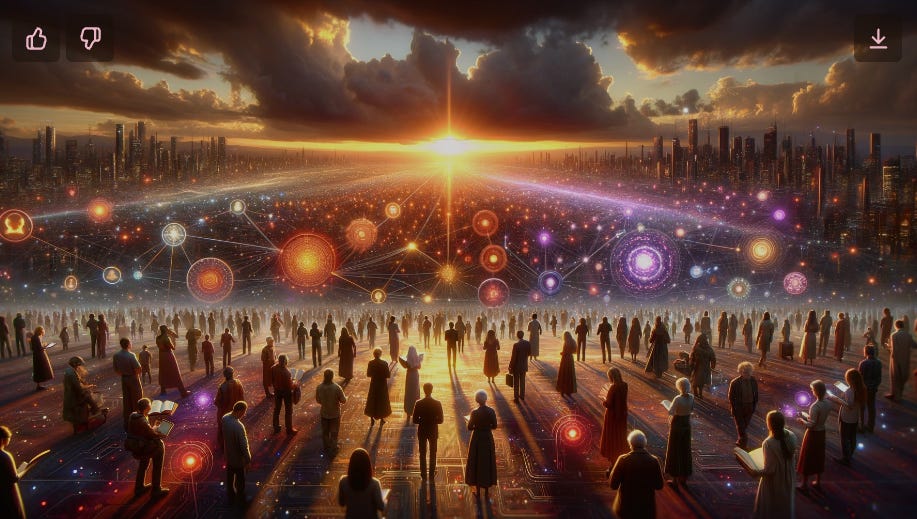











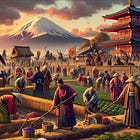








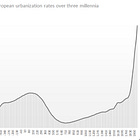






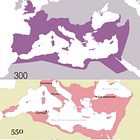






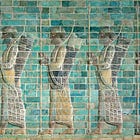









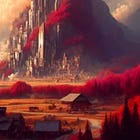


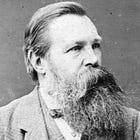







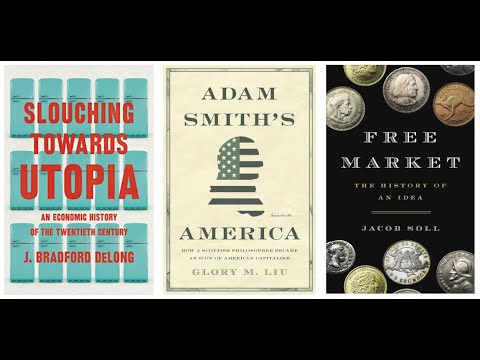







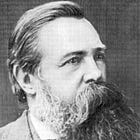






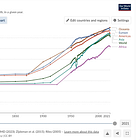



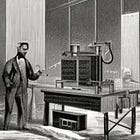

















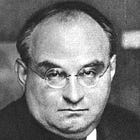


























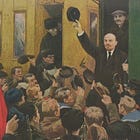
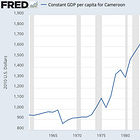






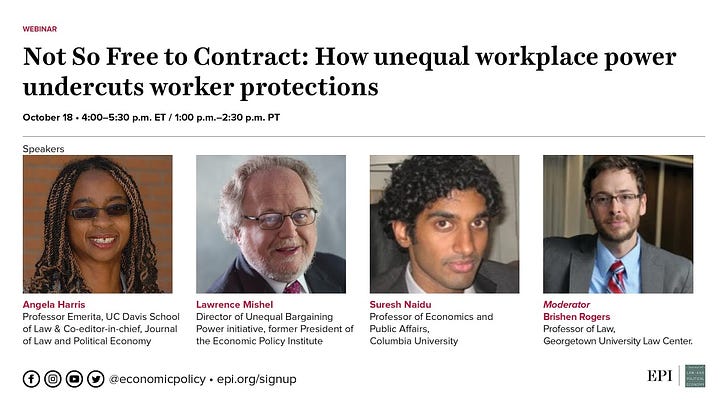

















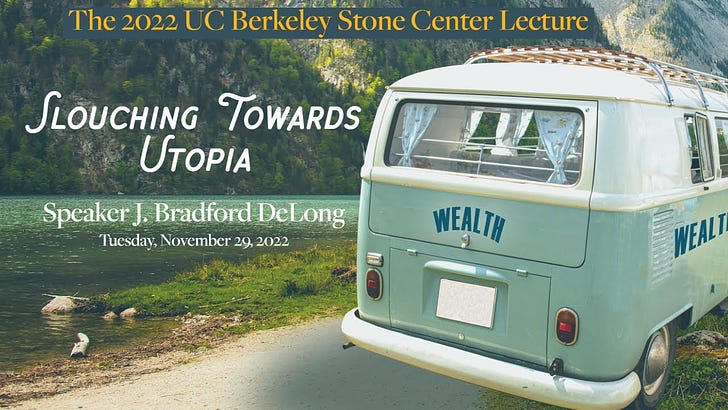


A class I'd love to take!
Suggestion would be that when you talk about the "age of domination" you talk about differences among types of domination regimes, and how empire could have good or bad effects for material wellbeing of people. The effects of trade and diffusion of ideas on economies, as well as the effects of war/fear of war and peace.
OK,Brad Delong too